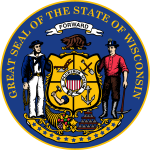Our website is made possible by displaying online advertisements to our visitors.
Please consider supporting us by disabling your ad blocker.
2012 Wisconsin Senate recall elections
| |||||||||||||||||||||||||||||||||||||
4 of the 33 seats in the Wisconsin State Senate 17 seats needed for a majority | |||||||||||||||||||||||||||||||||||||
|---|---|---|---|---|---|---|---|---|---|---|---|---|---|---|---|---|---|---|---|---|---|---|---|---|---|---|---|---|---|---|---|---|---|---|---|---|---|
| |||||||||||||||||||||||||||||||||||||
 Results of the elections: Democratic gain Republican hold No election | |||||||||||||||||||||||||||||||||||||
| |||||||||||||||||||||||||||||||||||||
| Elections in Wisconsin |
|---|
 |
Recall elections for four Wisconsin state senators were held during the spring of 2012. Voters put four state senators up for recall, all Republicans, because of the budget repair bill proposed by Governor Scott Walker and circumstances surrounding it. Democrats targeted Republicans for voting to significantly limit public employee collective bargaining. Scholars could cite only four times in American history when more than one state legislator has been recalled at roughly the same time over the same issue. The recall elections occurred on June 5, with May 8 being the date of the primary election.[1]
These recall elections followed the largest group of recall elections in U.S. history during the previous year, in which Republicans kept control of the Wisconsin Senate. In the June 5, 2012 recall elections, Democrats appeared to have taken over one seat from Republicans. Although the victory gave Democrats control of the Senate, the state legislature would not be in regular session again until after the November 2012 election when control of the legislature would again be contested.[2][3][4] After the November 2012 election, Republicans regained control of the state Senate due to the resignation of one Democrat and two losses by Democrats to Republicans.[5]
- ^ "Judge OKs petition review extension, June 5 recall election". Host.madison.com. March 15, 2012. Retrieved June 8, 2012.
- ^ STEPHANIE JONES. "Lehman declares win: The Journal Times Online". Journaltimes.com. Retrieved June 8, 2012.
- ^ Todd Richmond. "Senate power likely shifts to Dems; Wanggaard ponders recount". Host.madison.com. Retrieved June 8, 2012.
- ^ Jack Craver. "Madison Politiscope: Democrats claim the state Senate — does it matter?". The Capital Times. Host.madison.com. Retrieved June 8, 2012.
- ^ Brendan O'Brien (November 7, 2012). "Wisconsin state Senate switches party for third time in two years". Reuters.
Previous Page Next Page




